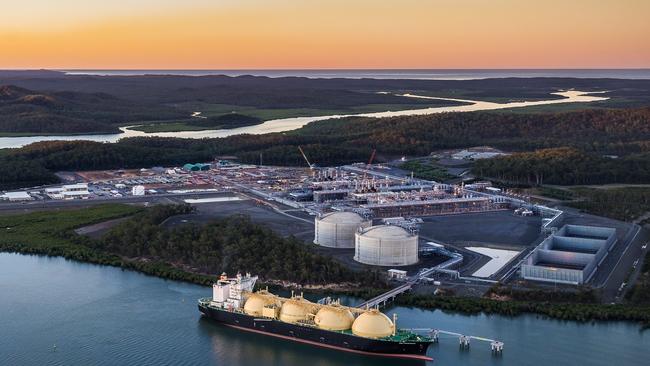Federal government review of Australian Domestic Gas Security Mechanism targets Santos
Santos and its partners on the giant GLNG gas export plant have complained the LNG trigger under review by the Albanese government unfairly targets its joint venture.

Business
Don't miss out on the headlines from Business. Followed categories will be added to My News.
Santos and its international partners on the $US18.5bn ($26.6bn) GLNG project in Queensland have railed against a plan by the Albanese government to extend a gas trigger mechanism, arguing it would be the only one targeted from the government intervention.
The federal government is urgently reviewing the Australian Domestic Gas Security Mechanism amid a national energy crisis sparked in part by a squeeze on gas supplies for users.
The existing mechanism, known as the gas trigger, can force big LNG exporters to divert supplies from their Queensland plants to domestic users if a local shortfall is declared.
However, the GLNG venture is the only project drawing gas from the domestic market, placing it in net deficit and meaning Santos and its partners – Malaysia’s Petronas, France’s Total and South Korea’s Kogas – would have to shoulder the shortfall burden by themselves, given they fail to meet the “net contributor” test.
With a broader review of the scheme also underway, Santos told the government it was against the federal government’s plan to extend the scheme until 2030.

“Santos does not support the long-term extension of the ADGSM before it is reviewed because the mechanism currently targets Santos and our GLNG partners. No other exporters would be materially impacted,” Santos said in a submission.
“The ADGSM, if implemented, would intervene in long-term gas contracts with GLNG customers in Korea and Malaysia, countries with which Australia has free trade agreements. Conversely, the ADGSM, if implemented, would not restrict the export of spot LNG cargoes by other Gladstone LNG projects which have gas excess to their contractual requirements.”
The concern confirms a report earlier this week in The Australian that the GLNG venture wants a key clause in the gas export trigger arrangements to be removed over fears it could be held solely responsible among exporters for topping up local supplies to avert a east coast gas shortage.
The ADGSM was due to expire at the end of 2022 but Resources Minister Madeleine King announced earlier in July it would be extended to 2030 to “help secure ongoing gas supplies to the next decade”.
A separate review of the gas trigger is also under way given questions about its effectiveness and how quickly it can be deployed to fix domestic shortfalls.
Australia’s east coast faces a renewed gas supply crunch this winter, particularly in Victoria where several generators have been told to restrict their gas use to ensure enough supplies are available for the state.
However, Santos said the ADGSM was the wrong tool to fix problems in the national electricity market.
“Santos contends that extension of the ADGSM would not solve current issues in the national electricity market and east coast gas market but will seriously damage Australia’s reputation with investors and customers in Asia, and with Asian countries with which Australia has free trade agreements,” the company said.
“Santos’ French, Korean and Malaysian investors in this joint venture are already cautious about investing in new supply following the 2017 introduction of the ADGSM which they regard as having raised sovereign risk in Australia. Extension of the ADGSM will continue to damage Australia’s reputation as a safe place to invest.”
Origin Energy, an investor in the APLNG project next door to GLNG, said it was wary of extending the ADGSM any further than 2025.
“We suggest limiting any extension (at least initially) to around 2025. This would provide an opportunity to consider the outcomes of any review process, while also allowing for an updated view of prevailing / forecast market conditions. Such an approach would not preclude any future extension of the mechanism beyond 2025 – if deemed to be warranted,” Origin said in its submission.
The group representing cement makers Boral and AdBri said a gas reservation scheme should also be considered as a solution to the ongoing gas crisis on the east coast.
“The ADGSM is a reactive policy mechanism designed to forecast and attempt to address a potential supply shortfall. The ADGSM does not address issues around the long-term supply and affordability of domestic gas in Australia,” the Cement Industry Federation said.
“Additional policy measures aimed at addressing the long-term supply of competitively priced gas in Australia should be considered. Examples include a potential domestic gas reservation policy as well as policies and measures aimed at encouraging broader domestic gas field development.”
Originally published as Federal government review of Australian Domestic Gas Security Mechanism targets Santos



